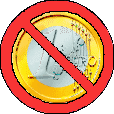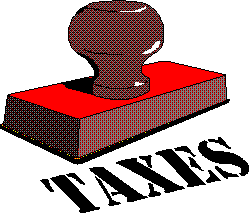
The unwanted Euro - tip of the iceberg

The public does not want the Euro. In opinion polls, at most about 1 in 3 and sometimes as few as 1 in 6 might support joining. (This depends on the question asked, and opposition rises when the respondent realises that this means scrapping the Pound).
It does not stop the Government from making preparations; it is a commitment of EU membership. The first wave of NHS preparations will cost £200m. (Ironically this counts as "more spending on health" even though the health of not one patient benefits). The public sector bill could reach £3.3Bn, and the total cost to the British economy £35Bn, noted accountants Chantrey Vellacott DFK.
(See link)Although the Government assures us that the public will have the final say in a referendum, it has already pushed through a law to ensure the playing field is far from level.
(Political Parties Elections & Referendums Act, 2000, see our feature)THE BIGGER PICTURE
The Euro is part of a larger initiative called ‘economic and monetary union’ – EMU. It is also primarily a political project – as the former French and German leaders Giscard d’Estaing and Helmut Schmidt openly admitted - creating a European currency as part of a European ‘identity’. (International Herald Tribune, 14.10.97)
Further evidence of this is in the way that various countries such as France, Italy and Belgium failed to meet the economic tests laid down for joining. The rules then had to be bent to avoid embarrassment.
(These countries had excessive public debt; in the case of France, also carrying out 'creative accounting')The birth of the Euro has been far from happy. Germany, Finland & the Irish Republic found a "single interest rate" was wrong for their economies, and Portugal has been threatened with fines after its public spending broke the rules.
Consumers in other countries such as France found prices being rounded up – Greeks boycotted shops while majorities in Holland and Germany wanted their old currencies back.
(Telegraph, 2.9.02)The grand design for EMU has unfolded over 50 years. The early days saw a ‘Common Market’, and is now called ‘the Single Market’ or ‘the internal market’ by those who think of a country called Europe.
Ironically Colchester and Buchan (two pro-European Economist journalists) noted in 1992 - Europe Relaunched that a 'common market' had a very limited validity and the more common goods and services needed to be adapted to national & local needs.
When the world progressively dismantled barriers to trade after WW2, the UK settled for the EEC that made it impossible to sell some goods to its members unless they were redesigned to meet new "harmonised" standards.
A net contributor to the EU/EEC budget over 30 years, we finance the Common Agricultural Policy that subsidises wasteful practices abroad and has increased the cost of food at home.
The so-called ‘conservation measure’ the Common Fisheries Policy has led to the illegal over-fishing of our stocks while both our politicians and the European Court looked away. We subsidise our competitors while we pay our own fishermen to burn their boats.

|
THE VAT TRAP... VAT is a commitment of EU membership. The UK does not currently levy VAT on politically sensitive items such as
The EU sees our zero-rating as ‘transient’ (temporary) and can use other measures to bypass our 'veto'. Much of its funding comes from the VAT we pay. The Daily Express (18.12.02) reported that the government is planning to introduce VAT on housing, which would cause pain to both buyers and sellers. |
‘Tax harmonisation’ is still on the EU agenda, despite claims to the contrary. Before 1998, the UK took 6% less tax from its people than was typical for the EU. Since Chancellor Brown signed up to a policy paper, The New European Way, our tax bills have rocketed (without a correspondingly big improvement in public services).
(Signed with ten other EU Social Democrat/Socialist Finance ministers, 17.11.98)It admitted that lower tax rates (for the UK) were considered to "distort competition". The Commissioner for taxation made it clear that "reform" was targeted where national tax levels were less than the EU average.
(Commissioner Monti, "Towards Tax Co-ordination in the EU", Telegraph, 22.10.97)A THREAT TO OUR PENSIONS
UK pensions are relatively better funded than on the continent, but Gordon Brown recently cut that advantage by raiding our funds.
Spokesmen for the National Association of Pension Funds have criticised proposals from the EU which would make pension schemes too expensive for most companies. "UK pensions are already under pressure… It is hard to understand why an effective & successful UK pensions model should be potentially destroyed".
Former pensions minister, Frank Field, blamed EU rules (FRS17) agreed without discussion in Parliament as a factor in the closure of many occupational pension schemes (FT, 20.2.02, also Times, 1.4/15.3.02).
The new 'Treaty of Nice' gives the EU powers to harmonise "social systems", living and working conditions. This could lead to obligations in subsidising under-funded continental pensions. (Ex-Commissioner Jacques Delors has also hinted this will happen). (Articles 136, 140. Delors, European Parliament, speech 1995)
…. AND OUR MORTGAGES?
Flexible mortgages are popular in the UK, and are designed to keep the cost of credit as low as possible. The Council of Mortgage Lenders attacked proposals from the European Commission for measures that were so costly and bureaucratic that they might kill them off. (D. Telegraph, 13.9.02)
…. AND OUR BUSINESS?
The new CBI chief "remains to be convinced" of a case for the Euro. The Institute of Directors gave the net annual cost of EU membership at £15-25 Bn (and doubled if taxes were harmonised!).
The British Chambers of Commerce website lists EU measures as the biggest burdens on firms. (See our links for BCC & IOD)
The Federation of Small Businesses' conference has voted to withdraw from the EU.
"In the Balance - 30 years of 'EU membership' examined"